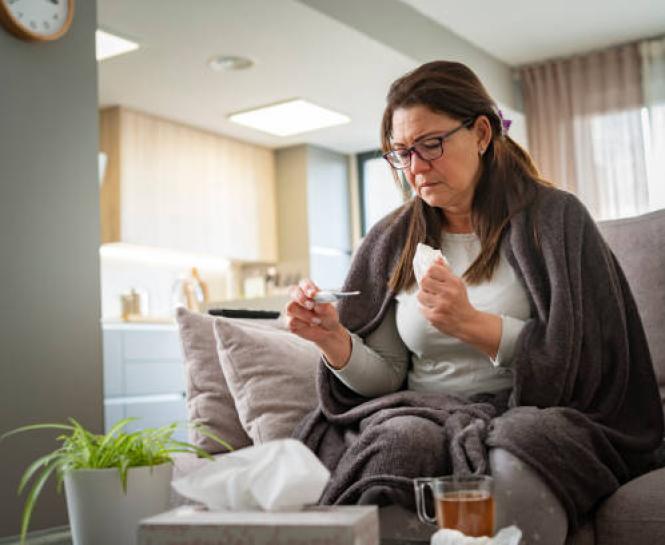If you have had a nagging dry cough that will not go away, accompanied by fatigue and a sore throat, you may have pneumonia or walking pneumonia.
Pneumonia is an infection that affects one or both lungs, causing the air sacs to fill up with fluid or pus. This liquid makes breathing difficult and can cause a cough, fever or chills. Bacteria, viruses or fungi can cause pneumonia. Bacterial pneumonia is the most common form of pneumonia. Bacteria that cause pneumonia include:
- Haemophilus influenza
- Streptococcus pneumoniae
Walking pneumonia is a non-medical term for a mild case of pneumonia. The medical term is atypical pneumonia. Bacteria that cause walking pneumonia include:
- Chlamydophila pneumoniae
- Legionella pneumoniae
- Mycoplasma pneumoniae
“In most cases, the symptoms of walking pneumonia are usually mild enough that you can still perform your daily activities,” said Yuliya Miras, MD, Catholic Health Primary Care Physician. “You may even have walking pneumonia and not know it.”
What are the symptoms of pneumonia and walking pneumonia?
Pneumonia and walking pneumonia have similar symptoms, although there are a few differences.
Symptoms of pneumonia may include:
- Confusion, especially in older adults
- Dry cough (without phlegm)
- High fever
- Loss of appetite
- Nausea and vomiting
- Rapid, shallow breathing
- Sharp or stabbing chest pain that gets worse with deep breaths or coughs
Symptoms of walking pneumonia may include:
- Chest pain or discomfort
- Headache
- Low fever
- Sneezing
- Sore throat
- Wet cough (producing phlegm)
Is one illness more severe than the other?
Dr. Miras explained that pneumonia is more severe than walking pneumonia and can require bed rest or hospitalization to get better. Although walking pneumonia is milder, it can take longer to go away.
How are pneumonia and walking pneumonia diagnosed?
A primary care physician (PCP) can diagnose pneumonia and walking pneumonia with a physical exam and diagnostic tests, such as blood tests or chest X-rays.
A blood test can confirm you have the infection and identify which germ is causing your illness. A chest X-ray can examine your lungs for inflammation.
Your PCP may also perform a sputum test to take a sample of mucus after a deep cough, which can determine the source of your infection.
What are the treatment options for pneumonia and walking pneumonia?
The treatment options for pneumonia and walking pneumonia depend on the cause. For bacterial infections, your PCP may prescribe antibiotics.
Make sure you finish your prescription, even if you start to feel better, to prevent the infection from coming back.
If a virus is the cause, you may be prescribed antiviral medication. However, viral infections will usually run their course with symptom management and rest.
Are pneumonia and walking pneumonia similar to bronchitis?
Pneumonia, walking pneumonia and bronchitis are all lung infections, so it can be difficult to tell them apart. They cause similar symptoms, such as coughing and fever. However, bronchitis occurs when the bronchial tubes that carry air to the lungs become infected and swollen. Pneumonia and walking pneumonia affect the air sacs in the lungs that exchange oxygen and carbon dioxide.
What is the recovery from pneumonia and walking pneumonia?
“Recovery from pneumonia and walking pneumonia can take time,” said Dr. Miras. “Many people feel better within a week, while others can take a month or longer.”
She noted that rest is essential for recovery, so do not rush to resume your daily activities if you still feel ill.
To prevent germs from spreading, limit your contact with friends and family while you are recovering. Cover your mouth when you cough or sneeze, and wash your hands often.
Can pneumonia and walking pneumonia come back?
If you do not complete your prescription, pneumonia and walking pneumonia can come back. Without finishing, you may still have some bacteria left in your body.
Getting pneumonia once does not protect you from getting it again. If you get pneumonia more than once, you may need additional tests to determine why.
Are pneumonia and walking pneumonia preventable?
Vaccines can prevent some forms of pneumonia, particularly those caused by streptococcus pneumoniae. Vaccines are especially important for:
- Adults 65 and older
- Children two and younger
- People with chronic diseases, long-term health issues or a weakened immune system
People who smoke can also benefit from vaccines, as smoking increases the risk of pneumonia.
Practicing good hygiene can also help reduce and prevent your risk of getting pneumonia and walking pneumonia by killing bacteria. Maintaining a healthy lifestyle helps keep your immune system strong.
“Talk to your PCP about when to get your annual flu shot to reduce your risk of getting influenza,” said Dr. Miras. “The flu can cause pneumonia in children, the elderly and pregnant people, so getting a flu vaccine can reduce that risk.”
Find Care at Catholic Health
Find a Catholic Health doctor near you. Or call 866-MY-LI-DOC (866-695-4362).
For convenient urgent care, visit Catholic Health Urgent Care at Centereach and Catholic Health Urgent Care at Ronkonkoma.






